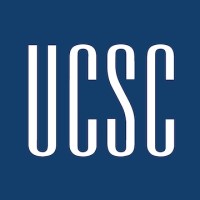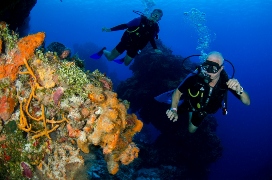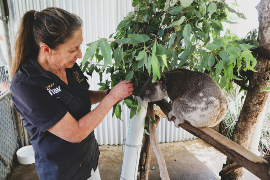Bachelor of Science in Marine Biology (Bachelors)
UC Santa Cruz
Santa Cruz, CA
The marine biology major is designed to introduce students to the great diversity of marine organisms and the biological and physical processes that affect these organisms, their populations, and their coastal and oceanic ecosystems. Curricular emphasis is on basic principles that help in understanding the processes that shape life in marine environments. The Department of Ecology and Evolutionary Biology (EEB) is located on the University of California, Santa Cruz, Coastal Science Campus (CSC). CSC is situated on Monterey Bay and its great diversity of coastal marine ecosystems, nature reserves, and state, federal, and private marine research institutions and management agencies. Both the National Marine Fisheries Service and the California Department of Fish and Game have laboratories located on the CSC, providing students with research and internship opportunities. Long Marine Laboratory on the CSC provides logistical support including diving and boating facilities, running seawater systems, and marine mammal facilities. Descriptions of nearby environments, institutions, and facilities are available through the EEB Department website.These resources, combined with computing and analytical facilities on main campus and the CSC, make for exceptional opportunities for the study of marine biology and its application to coastal conservation and management. Students can readily engage in basic and applied (e.g., fisheries management) research from estuaries to the deep sea, and plankton to whales.
Program Learning Outcomes
The undergraduate curriculum offered by the Department of Ecology and Evolutionary Biology (EEB) is designed to ensure that all students declared in any EEB sponsored major will achieve the following seven program learning outcomes.
✔ Students will demonstrate broad-based knowledge of the fundamentals of ecology, behavior, evolution and physiology and the relationships among these disciplines.
✔ Students will demonstrate skills in the observation and experimental study of organisms, using both field-based and laboratory-based approaches.
✔ Students will demonstrate skills in identifying, accessing, comprehending and synthesizing scientific information, including interpretation of the primary scientific literature. This includes understanding key questions and hypotheses, interpreting results and conclusions, and evaluating quality through critique.
✔ Students will demonstrate the ability to conceive and execute independent scientific research, including developing their own questions and hypotheses, designing an appropriate theoretical or empirical/experimental approach, executing that approach, and analyzing and interpreting data.
✔ Students will demonstrate an ability to understand and apply fundamental quantitative skills, including models and statistical analyses, so as to properly interpret published research and apply such skills in their own research.
✔ Students will demonstrate the ability to communicate scientific work, such as a scientific paper, proposal, essay, or notebook, in written, oral or poster format.
✔ Students will exhibit strong teamwork and problem solving skills. They will demonstrate the ability to make arguments from evidence and work together to find optimal solutions.








